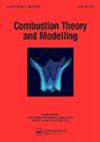Reaction-Diffusion Manifolds including differential diffusion applied to methane/air combustion in strong extinction regimes
IF 1.6
4区 工程技术
Q4 ENERGY & FUELS
引用次数: 2
Abstract
Detailed chemistry simulations of turbulent reacting flows involving combustion of hydrocarbons can easily exceed the available computational resources, depending on the dimensions of the chemical system. Previous work of the authors showed how the combination of the Eulerian Stochastic Fields (ESF) model with tabulated chemistry based on 2-dimensional Reaction-Diffusion Manifolds (REDIM) provided a significant computational speed-up, compared to the finite rate ESF solver. In this work, the behaviour for flame F, featuring a strong degree of extinction, is further investigated. A comparison is performed for 2D and 3D databases, both using simplified and detailed transport, where the scalar dissipation rate is included as the third table parameter. The results show that the upstream sections are well captured by the REDIM built for detailed transport, while the downstream sections are better captured by the simplified transport database. While a 3D-REDIM based on simplified transport seems to be necessary to capture the extinction events, a 2D-REDIM with differential diffusion already provides satisfactory results. Overall, the use of a 3D-REDIM with differential diffusion better describes the global behaviour of flame F.反应-扩散流形,包括应用于强消光条件下甲烷/空气燃烧的微分扩散
根据化学系统的尺寸,涉及碳氢化合物燃烧的湍流反应流的详细化学模拟很容易超过可用的计算资源。作者之前的工作表明,与有限速率的ESF求解器相比,欧拉随机场(ESF)模型与基于二维反应扩散流形(REDIM)的表化化学相结合,如何提供显著的计算速度加快。在这项工作中,火焰F的行为,具有强烈的熄灭程度,进一步研究。对二维和三维数据库进行了比较,使用简化和详细传输,其中标量耗散率作为第三个表参数。结果表明,建立的详细输运REDIM能较好地捕获上游断面,而简化输运数据库能较好地捕获下游断面。虽然基于简化输运的3D-REDIM似乎是捕获灭绝事件的必要条件,但具有微分扩散的2D-REDIM已经提供了令人满意的结果。总体而言,使用具有微分扩散的3D-REDIM可以更好地描述火焰F的全局行为。
本文章由计算机程序翻译,如有差异,请以英文原文为准。
求助全文
约1分钟内获得全文
求助全文
来源期刊

Combustion Theory and Modelling
工程技术-工程:化工
CiteScore
3.00
自引率
7.70%
发文量
38
审稿时长
6 months
期刊介绍:
Combustion Theory and Modelling is a leading international journal devoted to the application of mathematical modelling, numerical simulation and experimental techniques to the study of combustion. Articles can cover a wide range of topics, such as: premixed laminar flames, laminar diffusion flames, turbulent combustion, fires, chemical kinetics, pollutant formation, microgravity, materials synthesis, chemical vapour deposition, catalysis, droplet and spray combustion, detonation dynamics, thermal explosions, ignition, energetic materials and propellants, burners and engine combustion. A diverse spectrum of mathematical methods may also be used, including large scale numerical simulation, hybrid computational schemes, front tracking, adaptive mesh refinement, optimized parallel computation, asymptotic methods and singular perturbation techniques, bifurcation theory, optimization methods, dynamical systems theory, cellular automata and discrete methods and probabilistic and statistical methods. Experimental studies that employ intrusive or nonintrusive diagnostics and are published in the Journal should be closely related to theoretical issues, by highlighting fundamental theoretical questions or by providing a sound basis for comparison with theory.
 求助内容:
求助内容: 应助结果提醒方式:
应助结果提醒方式:


